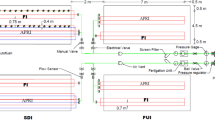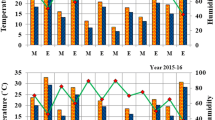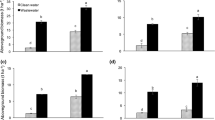Abstract
Freshwater scarcity and soil salinity are amongst the main obstacles for sustainable development of irrigated agriculture, particularly in arid regions. A 2-year field investigation was conducted at an experimental field in south-east Iran during the 2017 and 2018 growing seasons to evaluate the individual and integrated effects of water-saving irrigation strategies and organic soil amendment (OSA) applications on yield and water productivity of ajwain (Trachyspermum ammi), which is known as an important medicinal plant in Iran. A split-plot design with 16 treatments was used in the field trial. Treatments were created by combining four irrigation strategies, including full irrigation with freshwater [FF], partial root-zone drying (PRD) with freshwater (PF), PRD with saline water (PS), and PRD with alternating application of fresh and saline water (PFS), were combined with four types of soil amendments, including no amendment (control), charcoal nano-biochar (NB), composted cow manure (CM), cow manure vermicompost (VM). Results showed that in the absence of OSA application, exposing crops to salinity/water stresses caused 3.7–17.6% and 4.5–17.7% reduction in the crop’s seed yield and above-ground biomass, respectively, while enhancing the crop’s oil concentration and oil yield by 9.1–30% and 1.4–18.3%, respectively. Along with a 34–63% freshwater saving, a 24.9–91.2% increase occurred in the crop’s water productivities compared to the FF treatments. Integrating OSA application with freshwater-saving irrigation caused up to 58, 27.1, 60, 138, and 285% increase in the crop’s seed yield, biomass, oil concentration, oil yield, and water productivity, respectively, compared to the FF-control treatment. However, VM performed best, and CM took second place. Based on the results, it can be concluded that such integrations provide opportunities for developing Ajwain’s production in arid regions with limited access to freshwater resources.



Similar content being viewed by others
References
Abdelkader MAI, Hassan HMS, Elboraie EAH (2019) Using proline treatments to promote growth and productivity of Rosmarinus officinalis L. plant grown under soil salinity conditions. Middle East J Appl Sci 9:700–710
Abdelraouf RE, Ragab R (2018) Applying partial root drying drip irrigation in the presence of organic mulching. Is that the best irrigation practice for arid regions? Field and modelling study using the saltmed model. Irrig Drain 67:491–507. https://doi.org/10.1002/ird.2249
Afzal M, Battilani A, Solimando D, Ragab R (2016) Improving water resources management using different irrigation strategies and water qualities: field and modelling study. Agric Water Manag 176:40–54. https://doi.org/10.1016/j.agwat.2016.05.005
Agbna GHD, Dongli S, Zhipeng L et al (2017) Effects of deficit irrigation and biochar addition on the growth, yield, and quality of tomato. Sci Hortic (amsterdam) 222:90–101. https://doi.org/10.1016/j.scienta.2017.05.004
Ahmed M, Ahmad S, Fayyaz-ul-Hassan et al (2019) Innovative processes and technologies for nutrient recovery from wastes: a comprehensive review. Sustain https://doi.org/10.3390/su11184938
Akhtar SS, Li G, Andersen MN et al (2014) Biochar enhances yield and quality of tomato under reduced irrigation. Agric Water Manag 138:37–44. https://doi.org/10.1016/j.agwat.2014.02.016
Al-Harbi AR, Obadi A, Al-Omran AM, Abdel-Razzak H (2020) Sweet peppers yield and quality as affected by biochar and compost as soil amendments under partial root irrigation. J Saudi Soc Agric Sci 19:452–460. https://doi.org/10.1016/j.jssas.2020.08.002
Ali S, Rizwan M, Qayyum MF et al (2017) Biochar soil amendment on alleviation of drought and salt stress in plants: a critical review. Environ Sci Pollut Res 24:12700–12712. https://doi.org/10.1007/s11356-017-8904-x
Alizadeh-Choobari O, Zawar-Reza P, Sturman A (2014) The “wind of 120 days” and dust storm activity over the Sistan Basin. Atmos Res 143:328–341. https://doi.org/10.1016/j.atmosres.2014.02.001
Alrajhi A, Beecham S, Hassanli A (2017) Effects of partial root-zone drying irrigation and water quality on soil physical and chemical properties. Agric Water Manag 182:117–125. https://doi.org/10.1016/j.agwat.2016.12.011
Ashraf M, Orooj A (2006) Salt stress effects on growth, ion accumulation and seed oil concentration in an arid zone traditional medicinal plant ajwain (Trachyspermum ammi [L.] Sprague). J Arid Environ 64:209–220. https://doi.org/10.1016/j.jaridenv.2005.04.015
Banerjee A, Roychoudhury A (2017) Effect of salinity stress on growth and physiology of medicinal plants. Med Plants Environ Challenges. https://doi.org/10.1007/978-3-319-68717-9_10
Bates LS, Waldren RP, Teare ID (1973) Rapid determination of free proline for water-stress studies. Plant Soil 39:205–207. https://doi.org/10.1007/BF00018060
Chai Q, Gan Y, Zhao C et al (2016) Regulated deficit irrigation for crop production under drought stress. A review. Agron Sustain Dev 36:1–21
Chehab H, Tekaya M, Hajlaoui H et al (2020) Complementary irrigation with saline water and soil organic amendments modified soil salinity, leaf Na+, productivity and oil phenols of olive trees (cv. Chemlali) grown under semiarid conditions. Agric Water Manag 237:106183. https://doi.org/10.1016/j.agwat.2020.106183
Çolak YB, Yazar A, Sesveren S, Çolak İ (2017) Evaluation of yield and leaf water potantial (LWP) for eggplant under varying irrigation regimes using surface and subsurface drip systems. Sci Hortic (amsterdam) 219:10–21. https://doi.org/10.1016/j.scienta.2017.02.051
Collins MJ, Fuentes S, Barlow EWR (2010) Partial rootzone drying and deficit irrigation increase stomatal sensitivity to vapour pressure deficit in anisohydric grapevines. Funct Plant Biol 37:128–138. https://doi.org/10.1071/FP09175
Conesa MR, Falagán N, de la Rosa JM et al (2016) Post-veraison deficit irrigation regimes enhance berry coloration and health-promoting bioactive compounds in “Crimson Seedless” table grapes. Agric Water Manag 163:9–18. https://doi.org/10.1016/j.agwat.2015.08.026
Consoli S, Stagno F, Vanella D et al (2017) Partial root-zone drying irrigation in orange orchards: Effects on water use and crop production characteristics. Eur J Agron 82:190–202. https://doi.org/10.1016/j.eja.2016.11.001
da Silva JR, Patterson AE, Rodrigues WP et al (2017) Photosynthetic acclimation to elevated CO2 combined with partial rootzone drying results in improved water use efficiency, drought tolerance and leaf carbon balance of grapevines (Vitis labrusca). Environ Exp Bot 134:82–95. https://doi.org/10.1016/j.envexpbot.2016.11.007
Daǧdelen N, Başal H, Yilmaz E et al (2009) Different drip irrigation regimes affect cotton yield, water use efficiency and fiber quality in western Turkey. Agric Water Manag 96:111–120. https://doi.org/10.1016/j.agwat.2008.07.003
Degaris KA, Walker RR, Loveys BR, Tyerman SD (2016) Comparative effects of deficit and partial root-zone drying irrigation techniques using moderately saline water on ion partitioning in Shiraz and Grenache grapevines. Aust J Grape Wine Res 22:296–306. https://doi.org/10.1111/ajgw.12220
Dry PR, Loveys BR (1998) Factors influencing grapevine vigour and the potential for control with partial rootzone drying. Aust J Grape Wine Res 4:140–148. https://doi.org/10.1111/j.1755-0238.1998.tb00143.x
du Toit PG, Dry PR, Loveys BR (2003) A preliminary investigation on partial rootzone drying (PRD) effects on grapevine performance, nitrogen assimilation and berry composition. South African J Enol Vitic 24:43–54
Fu F, Li F, Kang S (2017) Alternate partial root-zone drip irrigation improves water - and nitrogen - use efficiencies of sweet-waxy maize with nitrogen fertigation. Sci Rep 7:1–10. https://doi.org/10.1038/s41598-017-17560-2
Ghasemi-Aghbolaghi S, Sepaskhah AR (2018) Barley (Hordeum vulgare L.) response to partial root drying irrigation, planting method and nitrogen application rates. Int J Plant Prod 12:13–24. https://doi.org/10.1007/s42106-017-0002-y
Ghrab M, Ayadi M, Gargouri K et al (2014) Long-term effects of partial root-zone drying (PRD) on yield, oil composition and quality of olive tree (cv. Chemlali) irrigated with saline water in arid land. J Food Compos Anal 36:90–97. https://doi.org/10.1016/j.jfca.2014.05.005
Ghrab M, Gargouri K, Bentaher H et al (2013) Water relations and yield of olive tree (cv. Chemlali) in response to partial root-zone drying (PRD) irrigation technique and salinity under arid climate. Agric Water Manag 123:1–11. https://doi.org/10.1016/j.agwat.2013.03.007
Gusmini G, Wehner TC, Donaghy SB (2007) SASQuant: A SAS software program to estimate genetic effects and heritabilities of quantitative traits in populations consisting of 6 related generations. J Hered 98:345–350. https://doi.org/10.1093/jhered/esm033
Haroon B, Irshad M, Hafeez F et al (2019) Fractionation of heavy metals in contaminated soil after amendment with composted cow manure and poultry litter. Arab J Geosci 12:1–13. https://doi.org/10.1007/s12517-019-4395-z
Hua L, Lu Z, Ma H, Jin S (2014) Effect of biochar on carbon dioxide release, organic carbon accumulation, and aggregation of soil. Environ Prog Sustain Energy 33:941–946. https://doi.org/10.1002/ep.11867
Iqbal R, Andersen MN, Raza MAS, et al (2019) Physiological manipulation and yield response of wheat grown with split root system under deficit irrigation. Pakistan J Agric Res https://doi.org/10.17582/journal.pjar/2019/32.3.514.526
Jovanovic Z, Stikic R (2018) Partial root-zone drying technique: from water saving to the improvement of a fruit quality. Front Sustain Food Syst 1:1–9. https://doi.org/10.3389/fsufs.2017.00003
Kalanaki M, Ritzema H, Bamshad R et al (2020a) Application of bio-desalinization for reclamation of salt-affected soil under composted cow manure and deficit irrigation with saline water. Paddy Water Environ 18:469–479. https://doi.org/10.1007/s10333-020-00795-7
Kalanaki MM, Karandish F, Ritzema H, Kalanaki MM (2020b) New pathways and the associated uncertainties for increasing maize water use efficiency under global warming. Arch Agron Soil Sci 00:1–15. https://doi.org/10.1080/03650340.2020.1864340
Kang S, Zhang J (2004) Controlled alternate partial root-zone irrigation: its physiological consequences and impact on water use efficiency. J Exp Bot 55(407):2437–2446
Karandish F (2016) Improved soil–plant water dynamics and economic water use efficiency in a maize field under locally water stress. Arch Agron Soil Sci 62(9):1311–1323. https://doi.org/10.1080/03650340.2015.1135326
Karandish F, Šimůnek J (2016a) A field-modeling study for assessing temporal variations of soil-water-crop interactions under water-saving irrigation strategies. Agric Water Manag 178:291–303. https://doi.org/10.1016/j.agwat.2016.10.009
Karandish F, Šimůnek J (2017) Two-dimensional modeling of nitrogen and water dynamics for various N-managed water-saving irrigation strategies using HYDRUS. Agric Water Manag 193:174–190. https://doi.org/10.1016/j.agwat.2017.07.023
Karandish F, Šimůnek J (2019) A comparison of the HYDRUS (2D/3D) and SALTMED models to investigate the influence of various water-saving irrigation strategies on the maize water footprint. Agric Water Manag 213:809–820. https://doi.org/10.1016/j.agwat.2018.11.023
Karandish F, Mousavi SS, Tabari H (2017) Climate change impact on precipitation and cardinal temperatures in different climatic zones in Iran: analyzing the probable effects on cereal water-use efficiency. Stoch Environ Res Risk Assess 31:2121–2146. https://doi.org/10.1007/s00477-016-1355-y
Khaleghi M, Hassanpour F, Karandish F, Shahnazari A (2020) Integrating partial root-zone drying and saline water irrigation to sustain sunflower production in freshwater-scarce regions. Agric Water Manag 234:106094. https://doi.org/10.1016/j.agwat.2020.106094
Leogrande R, Vitti C (2019) Use of organic amendments to reclaim saline and sodic soils: a review. Arid l Res Manag 33:1–21
Liu F, Shahnazari A, Andersen MN et al (2006) Physiological responses of potato (Solanum tuberosum L.) to partial root-zone drying: ABA signalling, leaf gas exchange, and water use efficiency. J Exp Bot 57:3727–3735. https://doi.org/10.1093/jxb/erl131
Liu H, Song F, Liu S et al (2018) Physiological response of maize and soybean to partial root-zone drying irrigation under N fertilization levels. Emirates J Food Agric 30:364–371. https://doi.org/10.9755/ejfa.2018.v30.i5.1678
Liu X, Wei Z, Ma Y et al (2021a) Effects of biochar amendment and reduced irrigation on growth, physiology, water-use efficiency and nutrients uptake of tobacco (Nicotiana tabacum L) on two different soil types. Sci Total Environ 770:144769. https://doi.org/10.1016/j.scitotenv.2020.144769
Liu X, Wei Z, Manevski K et al (2021b) Partial root-zone drying irrigation increases water-use efficiency of tobacco plants amended with biochar. Ind Crops Prod 166:113487. https://doi.org/10.1016/j.indcrop.2021.113487
Mekonnen MM, Hoekstra AY (2016) Sustainability: four billion people facing severe water scarcity. Sci Adv. https://doi.org/10.1126/sciadv.1500323
Mossad A, Scalisi A, Lo Bianco R (2018) Growth and water relations of field-grown ‘Valencia’ orange trees under long-term partial rootzone drying. Irrig Sci 36:9–24. https://doi.org/10.1007/s00271-017-0562-8
Novak JM, Busscher WJ, Laird DL et al (2009) Impact of biochar amendment on fertility of a southeastern coastal plain soil. Soil Sci 174:105–112. https://doi.org/10.1097/SS.0b013e3181981d9a
Obadi A, AlHarbi A, Abdel-Razzak H, Al-Omran A (2020) Biochar and compost as soil amendments: effect on sweet pepper (Capsicum annuum L.) growth under partial root zone drying irrigation. Arab J Geosci 13:1–12. https://doi.org/10.1007/s12517-020-05529-x
Odula O, Wesonga J, Masinde P, Stützel H (2016) Is partial root zone drying irrigation a feasible water saving strategy in african leafy vegetable production? A review. African J Hortic Sci 10:53–63
Omer EA, Said-Al Ahl HAH, El Gendy AG (2014) Yield and essential oil of Ajwain (Trachyspermum ammi) plant cultivated in saline soil of North Sinai in Egypt. J Essent Oil-Bearing Plants 17:469–477. https://doi.org/10.1080/0972060X.2014.895178
Rehman MZU, Rizwan M, Ali S et al (2016) Contrasting effects of biochar, compost and farm manure on alleviation of nickel toxicity in maize (Zea mays L.) in relation to plant growth, photosynthesis and metal uptake. Ecotoxicol Environ Saf 133:218–225. https://doi.org/10.1016/j.ecoenv.2016.07.023
Rizwan M, Lee JH, Gani R (2015) Optimal design of microalgae-based biorefinery: economics, opportunities and challenges. Appl Energy 150:69–79. https://doi.org/10.1016/j.apenergy.2015.04.018
Sepaskhah AR, Ahmadi SH (2010) A review on partial root-zone drying irrigation. Int J Plant Prod 4:241–258
Shahnazari A, Liu F, Andersen MN et al (2007) Effects of partial root-zone drying on yield, tuber size and water use efficiency in potato under field conditions. F Crop Res 100:117–124. https://doi.org/10.1016/j.fcr.2006.05.010
Shahrokhnia MH, Sepaskhah AR (2016) Effects of irrigation strategies, planting methods and nitrogen fertilization on yield, water and nitrogen efficiencies of safflower. Agric Water Manag 172:18–30. https://doi.org/10.1016/j.agwat.2016.04.010
Sharifi P, Shorafa M, Mohammadi MH (2019) Comparison of the effect of Cow manure, Vermicompost, and Azolla on safflower growth in a saline-sodic soil. Commun Soil Sci Plant Anal 50:1417–1424. https://doi.org/10.1080/00103624.2019.1621331
Singh B, Singh BP, Cowie AL (2010) Characterisation and evaluation of biochars for their application as a soil amendment. Aust J Soil Res 48(7):516–525
Sujatha S, Bhat R (2010) Response of vanilla (Vanilla planifolia A.) intercropped in arecanut to irrigation and nutrition in humid tropics of India. Agric Water Manag 97:988–994. https://doi.org/10.1016/j.agwat.2010.01.031
Xu L, Yan D, Ren X et al (2016) Vermicompost improves the physiological and biochemical responses of blessed thistle (Silybum marianum Gaertn.) and peppermint (Mentha haplocalyx Briq) to salinity stress. Ind Crops Prod 94:574–585. https://doi.org/10.1016/j.indcrop.2016.09.023
Yactayo W, Ramírez DA, German T et al (2017) Improving potato cultivation using siphons for partial root-zone drying irrigation: a case study in the Blue Nile river basin, Ethiopia. Open Agric 2:255–259. https://doi.org/10.1515/opag-2017-0028
Yarami N, Sepaskhah AR (2015) Saffron response to irrigation water salinity, cow manure and planting method. Agric Water Manag 150:57–66. https://doi.org/10.1016/j.agwat.2014.12.004
Yazar A, Gökçel F, Sezen MS (2009) Corn yield response to partial rootzone drying and deficit irrigation strategies applied with drip system. Plant Soil Environ 55:494–503
Zeeshan M, Lu M, Sehar S et al (2020) Comparison of biochemical, anatomical, morphological, and physiological responses to salinity stress in wheat and barley genotypes deferring in salinity tolerance. Agronomy 10:1–15. https://doi.org/10.3390/agronomy10010127
Author information
Authors and Affiliations
Corresponding author
Additional information
Publisher's Note
Springer Nature remains neutral with regard to jurisdictional claims in published maps and institutional affiliations.
Rights and permissions
About this article
Cite this article
Kalanaki, M., Karandish, F., Afrasiab, P. et al. Assessing the influence of integrating soil amendment applications with saline water irrigation on Ajwain’s yield and water productivity. Irrig Sci 40, 71–85 (2022). https://doi.org/10.1007/s00271-021-00759-7
Received:
Accepted:
Published:
Issue Date:
DOI: https://doi.org/10.1007/s00271-021-00759-7




